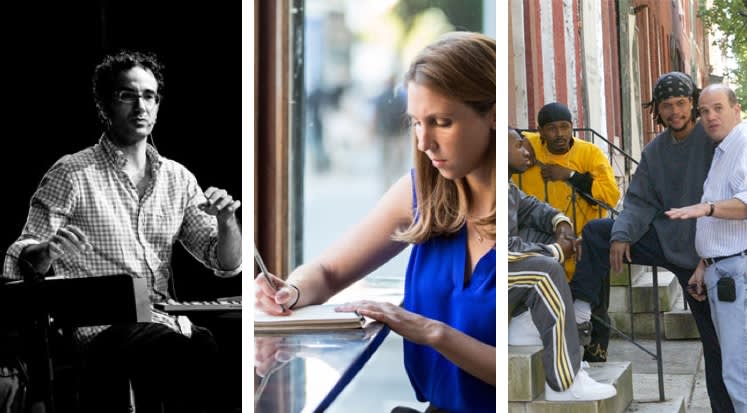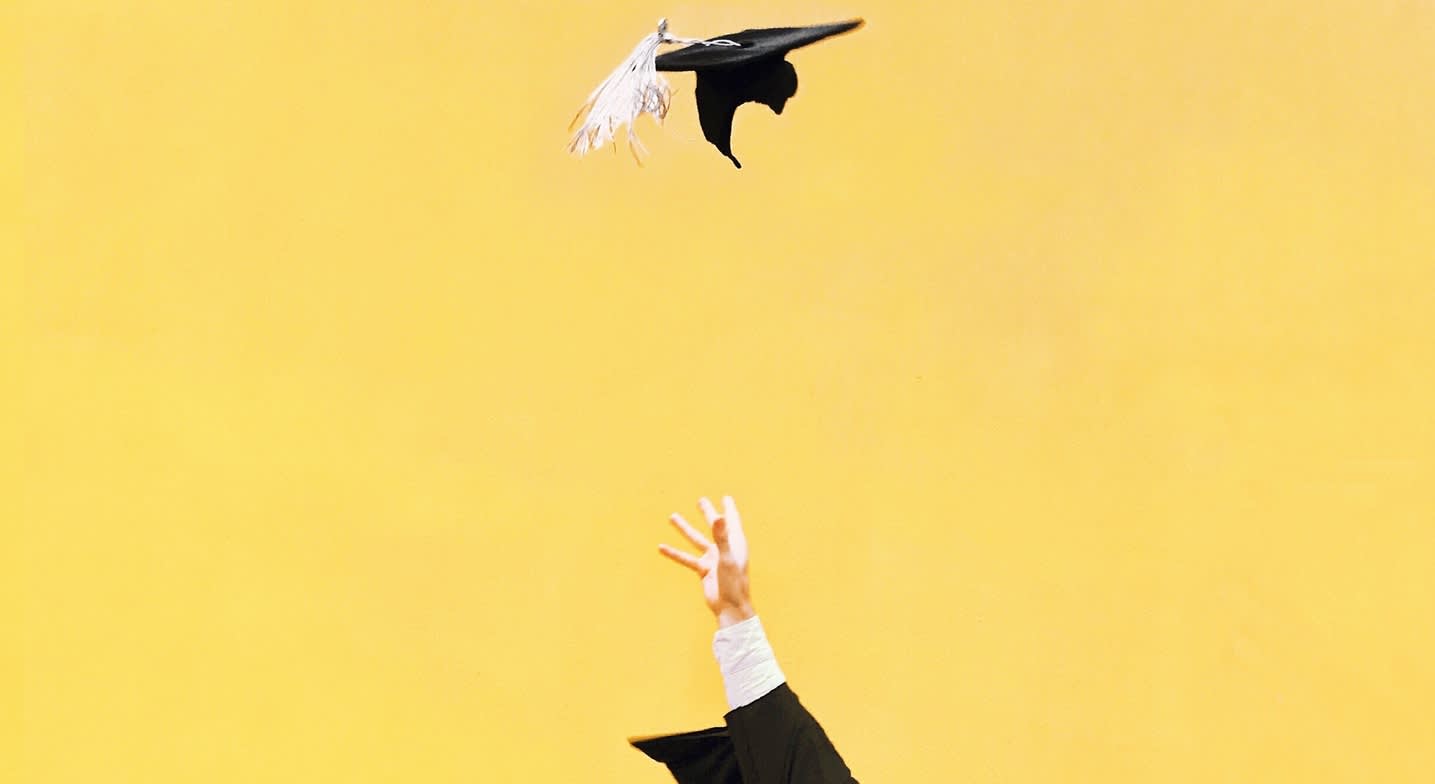Note: Transcript may not match audio exactly.
Parents, Professors, Distinguished Faculty, Graduates:
Welcome to the rest of your life. I shall see you off. Now, I myself have done nothing inspiring, due to being a mere media parasite … but dude, I know people!
In particular, I know a whole lot of MacArthur “Genius” fellows, whom I’ve been chatting up for some time. Unfortunately, they can’t be here today due to prior commitments, so I will channel their experience and wisdom to furnish three simple life lessons for you as you set off into career, citizenship, credit-card debt, and all that goes with your fledgling adulthood. The first has to do with your very next step …
1) So you don’t know what you’re going to do with your life? Big deal.
Will Allen, 2008 MacArthur Fellow, graduated the University of Miami imagining he wanted to be a professional basketball player. Of all quixotic dreams. Then he became a professional basketball player in the old ABA, and then later in the European league. But this was a mere placeholder. Later, he ran a group of local chain restaurants. Even later, he sold paper goods for Procter & Gamble. Only then did his many talents and interests — sales, management, teamwork, hard physical effort — coalesce. Will then turned his sights on … urban farming.
[Will Allen]: “It was like a puzzle where I had a lot of the pieces already because of my knowledge of farming and my ability to work with people and develop relationships. But it was like, I call it a ‘food system puzzle,’ where you need this next piece to help all the other pieces … “
His Growing Power, Inc. has brought healthy, organic foods to inner-city Milwaukee, opportunities for at-risk youthful employees, and a model for profitable, vertical farming throughout the world.
MIT educator and 2004 MacArthur Fellow Amy B. Smith was a high school athlete and musician with many interests and a generous spirit, but laser focus? Not so much. After college, she joined the Peace Corps. Posted in Botswana, she taught and ran the volleyball, math, science, business, and beekeeping clubs.
[Amy B. Smith]: “And so then I had an opportunity to extend my contract and become the regional beekeeping officer for the Ngamiland District, which is not an opportunity to be turned down. I mean, it does not knock twice.”
Heh heh, no. But it cemented the idea of working with people to cultivate sustainable local development. When she returned to the States, she obtained a masters in mechanical engineering, which she used not merely to find low-cost design solutions for subsistence farmers, but to engineer a global network dedicated equally to innovation and self-sufficiency. Her D-Lab at MIT has not only spawned life-changing inventions, it has pioneered what she calls “creative capacity building” as a core principle of sustainable economic development.
Jad Abumrad, 2011 MacArthur “Genius,” absolutely didknow what he wanted to be. From his early teens, he fixated on composing musical scores for movies. He went to music school, he tried his hardest, but he was a terrible movie-score composer.
[Jad Abumrad]: (Bit of ‘dreamy’ music plays) “That’s what I do, Bob, I have two modes: I have noisy and then I have dreamy. I was having one of those sort of — at the time it felt horrible, but I think very ordinary — post-college-flail moments where you realize the world is not unfurling before you like a red carpet. And I was like, ‘Crap what do I do?’ Then my girlfriend at the time, who’s now my wife, suggested radio. She said, ‘You like to write. You like to make music. Maybe if you did them together it would be a third thing and maybe that would work.’ Well, okay.”
The third thing worked. Abumrad went on to conceive and host Radiolab, the revolutionary public-radio show and podcast, which has won the prestigious Peabody Award and about every other broadcasting honor out there, not to mention an audience numbering in the millions.

From left: MacArthur Fellows Jad Abumrad, Sarah Stillman, and David Simon.
2) Do not dismiss your childhood self. What mattered to you then may inform your desires, interests, and choices for the rest of your life.
Not only did Luis von Ahn (MacArthur Fellow 2006) like to play with his Commodore 64 computer when he was a little kid growing up in Guatemala, he liked to invent. When he was 12, he had an idea for capturing the energy expended by humans trying to keep fit.
[Luis von Ahn]: I wanted to have a gym where going there was free. But the way we would make money is by connecting all of the machines to the power grid. (Laughs.)And we would sell it to the power company. People would come in for free, but in reality, they were working for us.
Nothing came of that idea, but the notion of double-dipping on human labor informed his invention of Captcha, those online squiggles used for insuring users aren’t bots — the process of which actually deciphers obscure bits of type for digitization of old books and documents. His Duolingoteaches languages for free, but the exercises translate text for commercial customers.
Sarah Stillman, 2016 MacArthur Fellow, is a long-form journalist specializing in the exploitation of the powerless — from Asian workers trafficked to indentured servitude at U.S. military bases to recklessly exposed police informants to children caught sexting, but dubiously marked forever as sex offenders.
Her passion for social justice began before she wrote her first book … at the age of 16. Her union-organizer mom and her anti-Apartheid activist dad sensitized her from an early age to institutional wrong. And Sarah did not take it quietly.
[Sarah Stillman]: “I remember writing a letter of protest to Highlights magazine … because they had this cartoon where they showed Goofus and Gallant, and Goofus was the jerk dumb kid who always did everything wrong. The twin brother, Gallant, always did everything just pitch perfect, and it felt really wrong to me that they were depicting the sibling relationship like one person is always really great and one person is always really crappy — this really isn’t fair to Goofus.”
3) Some of your worst qualities, aren’t, necessarily.
James Randi (MacArthur Fellow, 1986) was an opinionated, argumentative, self-righteous teenager with little respect for authority or orthodoxy of any kind. If he didn’t believe you, he didn’t believe you, whether you were a parent, teacher, clergyman, or anyone else presumed to know better. He dropped out of high school in his last week.
[James Randi]: “I had to write the final examinations and the first examination was in English literature. I sat down and opened the examination paper and I was told to begin and everybody bent forward and started and the first question on the paper was referring to Shakespeare’s play Macbeth; show that Lady Macbeth was actually responsible for King Macbeth’s downfall. I looked at the blank piece of paper in front of me. I wrote across it, ‘This is a premise which I cannot support.’”
And then he quit school to join the circus. The adolescent skeptic became a magician, escape artist, and mentalist … until he realized his audience believed too much in the illusions and wouldn’t accept “it’s just a trick” for an answer. He then devoted his life to debunking self-described psychics, faith healers, and mediums — most notably spoon-bender Uri Geller and televangelist Peter Popoff. The little smart aleck prodigy, at age 88, is now a worldwide championof human reason.
[James]: “I know I’m fighting a giant of superstition and irrationality. But if you don’t fight the battle you can’t win.”
And then there is David Simon, also argumentative, also a flouter of authority, as thin of skin as he is stout of heart. He grew up arguing at his family dinner table, a skill he honed as a Baltimore newspaperman given to shouting matches with sources and bosses alike. As a reporter, he was deeply suspicious of impure motives, deeply resentful of careerism and vanity, and deeply pissed off at The Man. He was a poster child of righteous indignation, with emphasis on the indignation. In short, a total pain in the ass.
Yet these very traits fueled a career as author, producer, and screenwriter that has yielded Homicide: Life on the Street, Treme, The Corner, Generation Kill, Show Me a Hero, and, most famously, The Wire — very possibly the greatest television series ever made.
In all of these shows, his contempt for corruption, obtuseness, and indifference shoots out of the screen like gamma rays. He takes things personally, which can be a personality disorder or a hallmark of empathy.
[David Simon]: “The only difference between me and the rest of journalism, was — at some point I always want to cop to that — there is a grudge moment of any teacher who ever gave you a ‘C’ on an essay that you thought should have been an ‘A’ … it was fuel.”
[Bob]: “You’ve got some Larry David in you; you’re righteous and combative on big injustices and also all the little ones.”
[David]: “Why waste an injustice?” (Laughs.)
Young graduates, go out into the world. Be patient for your moment, be true to yourself, and be a warrior for justice. Not because I said so, but — as I think I explained — I know people.
Bob Garfield is the host and creator of The Genius Dialogues on Audible, and the host of NPR’s On The Media.




